Goodbye Paolo: the career of Paolo Rossi in Italy - Arrivederci Paolo: la carriera di Paolo Rossi in Italia [ENG-ITA]
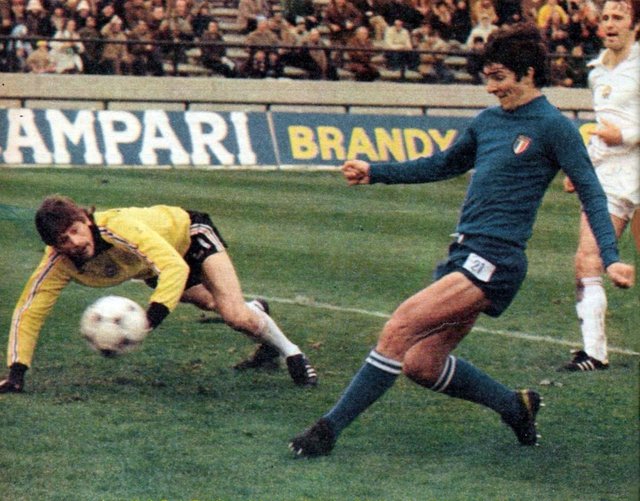
Paolo Rossi. Public domain image
English version
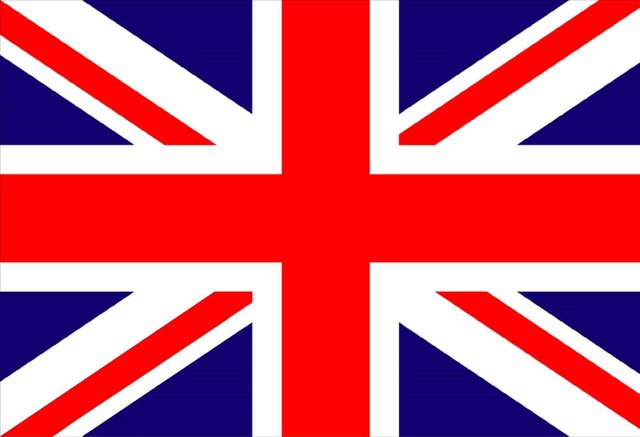
After the tragic death of Diego Armando Maradona, who died in his Tigre house, on November 25th, the world of football mourns another sad death, that of Paolo Rossi, italian hero of the World Cup played in Spain, in 1982.
Paolo was struck down at 64 by an incurable disease, after a long battle waged with the support of his wife, Federica Capelletti, who wanted to greet him for the last time on social media with a simple sentence:
Forever ...
And it is forever that the deeds of Rossi will live in the memory of football fans all over the world: with this post I intend to pay tribute to Pablito's career, retracing its entire duration, from the beginning to the day of retirement, for to remember once again the feats with which he made the fans of the teams in which he played, as well as those of an entire nation, fall in love.
The beginnings
Paolo Rossi arrives at Juventus in 1972, aged just sixteen. To notice it in a youth tournament, and want it more than anyone, is a very young observer of the Piedmontese, that Luciano Moggi destined to sadly go down in history for the facts of Calciopoli.
Despite the contrary opinion of his parents, disappointed by the unfortunate experience of Paolo's brother in Turin, Rossi is included in the youth teams of Juventus, making his debut two years later in the first team in an Italian Cup match.
The numerous injuries did not prevent him from emerging the following year, in which he recorded two more appearances with the first team, before being loaned to Como at the end of the season, to complete his maturity.
Como (1975-1976)
Paolo Rossi arrives at Como, where he signs his first professional contract, on the advice of Marco Tardelli, who had played with the Larian team until the year before.
There is a guy who always puts me in difficulty during the matches. His name is Paolo Rossi ...
The sports director of the Lombard team, Giancarlo Beltrami, then immediately gets in touch with Boniperti, who gladly accepts the loan request, seeing an excellent opportunity to grow that talent. Rossi, however, will have little space at Como, being able to count on only six appearances at the end of the year and on a sad relegation to Serie B. Interviewed years later about his experience in Como, Rossi will have no qualms about admitting his difficulties:
I was not even given the opportunity to show my qualities. I was on loan from Juventus, I was 19. Como was a team that did not do well and in which there was no space for me. The only positive memory is for the city.
After the only entire match played in Serie A with the Como shirt, the home match against Fiorentina, Rossi, whistled by the public, contacts Boniperti, clearly telling him not to want to stay in that environment that, with Cancian first and with Bagnoli then, seems to place no trust in him.
Vicenza (1976-1979)
Paolo, therefore, starts again from Lanerossi Vicenza and Serie B, an environment in which he finds his self-confidence thanks also to the presence of the coach Giovan Battista Fabbri, to whom the footballer originally from Prato is very close. In spite of the initial discontent that winds through the city, the team plays a great championship by being promoted to Serie A; Rossi is the top scorer with 21 goals and accepts the proposal of the president Giuseppe Farina to stay also for the next year's adventure in the major series, despite requests from all parts of Italy.
The choice seems very appropriate, because Vicenza, against all odds, repeats the magical performances of the previous year, coming to contend for the championship at Juventus. The second place of the Venetian team joins the second title of top scorer for Rossi, who with 24 goals leads the ranking of the strikers also in Serie A, becoming the first player in history to hit this particular double.
Bearzot summons him to the national team by popular acclaim for the 1978 Argentine World Cup, in which Italy closes in fourth place thanks to the three goals of the Tuscan center forward, now one of the strong points of football Italian, but unfortunately yet another injury suffered during a Uefa Cup match affects the following season.
Vicenza, deprived of its symbolic man for a long time, gives in with a crash and relegates back to Serie B: Paolo, now a sort of national star, considers the cadet series too narrow for him, and, in agreement with the president Farina, is loaned for two years to Perugia, in the meantime on the rise.
Perugia (1979-1980)
Bringing one of the strongest Italian strikers to a provincial team is a rather onerous operation, and the then-president of Perugia, Franco D'Attoma, invented a method to finance the passage of Rossi to his team: sponsor the game jersey. With this move, destined to remain in history, Rossi can contribute to the team's excellent seventh-place finish, with thirteen goals in 28 games; in the Umbrian city, he meets his future wife, the journalist Federica Cappelletti, but will be forced to undergo the most humiliating moment of his career, becoming involved in the football clandestine betting scandal.
Convicted guilty of having in some way contributed to altering the result of Avellino-Perugia match (in which he scored a double), he is disqualified for two years, thus ending his Perugian adventure prematurely, but the trial that will follow will absolve him of any responsibility, even without being able to give him back that period of forced break.
Juventus (1981-1985)
Although with one more year of suspension to serve, Boniperti calls Rossi again to bring him back to Juve, blindly believing in the player's recovery:
You will come with us, you will train with the other players, even more than the others ... Show up with short hair and, if you can, get married, so you are calmer ...
He has time to participate in the last three matches of the 1981-82 tournament and to score in the match against Udinese, thus making his small contribution to winning the twenty-second championship of Juventus.
We are in the summer of 1982, time for the World Cup, and Bearzot calls him despite the two years spent without playing, leaving behind the top scorer of the championship, Roberto Pruzzo. In Italy, the controversy flares up furious, but the coach's move turns out to be very apt because Rossi will lead the Azzurri to the conquest of their third world championship, scoring six goals (the hat-trick to Brazil is famous in the group of quarter-finals) and becoming for everyone "Pablito", the hero of Spain '82.
In the following two years he won with Juve a Scudetto, the Cup Winners Cup, the European Super Cup, the Champions Cup and the Golden Ball, but also thanks to the increasingly frequent physical ailments, it is used less consistently. The relationship with the environment breaks down, and the player gets, at the end of the 1984/85 championship, to be sold to Milan.
I became a kind of draw defenders, it was a choice of Trapattoni dictated by necessity. Then came Boniek, Platini, there was Bettega: someone had to stay out and, a strange case, it was always my turn ...
Milan (1985-1986) and Verona (1986-87)
At Milan an old acquaintance of Rossi becomes president, that Giuseppe Farina who had already welcomed him at Vicenza, and the player moves to the Rossoneri team full of renewed enthusiasm. However, the Milanese season is not the best, also because it is still studded with injuries: Rossi scores only two goals, both in the derby with Inter, thus becoming the second player in history to score a brace in the first Milanese derby disputed.
I felt like I was at the Mundial. If Inter had had yellow jerseys like Brazil, I might have scored three goals. But that's okay
The disappointing seventh final place pushes the Rossoneri to a profound renewal, and Rossi moves to Verona, in the negotiation that leads Galderisi to Milan. With the Venetian team, he scored four goals (three of which from a penalty kick), reaching fourth place.
At the end of the season, he decides to retire at the age of 31, tormented by the increasingly frequent problems with his knees.
Personal memories
About Paolo Rossi, a character who entered the collective imagination for different aspects, I have some very beautiful memories. I was six when, after winning the World Cup, I took to the streets accompanied by my uncle, to participate in the celebrations. Several trumpeting cars passed, and on one of these, some boys wrapped in tricolor flags, repeated in chorus:
Rossi, Rossi, Rossi!
The following year, walking around Turin with my father and uncle himself, we met Paolo in the company of his teammate Domenico Marocchino; my uncle recognized him and he stopped to greet us, kissing my brother on the cheek, who looked at him in amazement in my father's arms.
I was struck by his sincere smile and the kindness with which he addressed us children: despite being one of the most famous footballers in the world, he did not hesitate for a moment to stop to chat, so much so that that scene is still part of my most precious memories.
Goodbye Paolo, I will miss you.
Read also:
Versione italiana
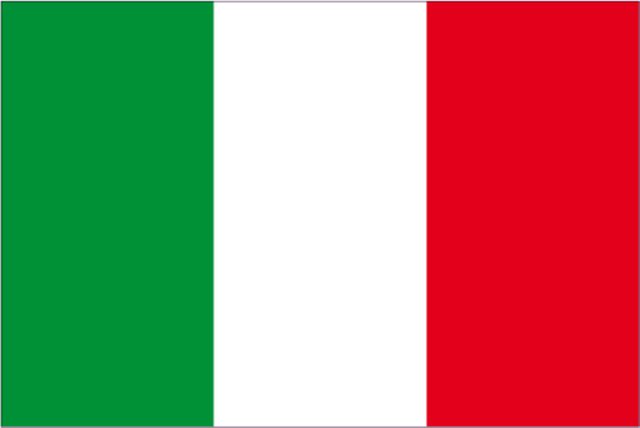
Dopo la tragica morte di Diego Armando Maradona, spentosi nella sua casa di Tigre, il 25 Novembre, l'universo del calcio è costretto a piangere un'altra triste scomparsa, quella di Paolo Rossi, eroe azzurro del Mondiale disputato in Spagna, nel 1982.
Paolo è stato stroncato a 64 anni da un male incurabile, dopo una lunga battaglia condotta con l'appoggio della moglie, Federica Capelletti, la quale ci ha tenuto a salutarlo per l'ultima volta sui social con una semplice frase:
Per sempre...
Ed è per sempre che le gesta di Rossi vivranno nella memoria degli appassionati di calcio di tutto il mondo: con questo post intendo rendere omaggio alla carriera di Pablito, ripercorrendone l'intera durata, dagli esordi al giorno del ritiro, per ricordare ancora una volta le prodezze con le quali ha fatto innamorare i tifosi delle squadre nelle quali ha militato, oltre a quelli di una nazione intera.
Gli esordi
Paolo Rossi arriva alla Juventus nel 1972, a soli sedici anni. A notarlo in un torneo giovanile, e volerlo più di tutti, è un giovanissimo osservatore dei piemontesi, quel Luciano Moggi destinato a passare tristemente alla storia per i fatti di calciopoli.
Nonostante il parere contrario dei genitori, scottati dalla poco felice esperienza del fratello di Paolo in bianconero, Rossi viene inserito nelle formazioni giovanili della Juventus, esordendo due anni dopo in prima squadra in una partita di Coppa Italia.
I numerosi infortuni non gli impediscono di mettersi in mostra anche l'anno successivo, nel quale mette a referto altre due presenze con la prima squadra, prima di essere girato a fine stagione al Como in prestito, per completare la sua maturazione.
Como (1975-1976)
Paolo Rossi arriva al Como, dove firma il suo primo contratto da professionista, su consiglio di Marco Tardelli, che aveva giocato fino all'anno prima con la formazione lariana.
C’è un ragazzo che durante le partitelle mi mette sempre in difficoltà. Si chiama Paolo Rossi...
Il direttore sportivo della squadra lombarda, Giancarlo Beltrami, si mette allora subito in contatto con Boniperti, che accetta di buon grado la richiesta di prestito, intravedendo un'ottima opportunità per far crescere quel talento. Rossi tuttavia godrà di poco spazio al Como, potendo contare a fine anno solo su sei presenze e su un'amara retrocessione in Serie B. Intervistato anni dopo sulla sua esperienza comasca, Rossi non avrà remore ad ammettere le sue difficoltà:
Non mi è stata data neppure l’opportunità di mettermi in mostra. Arrivavo in prestito dalla Juventus, avevo 19 anni. Il Como era una squadra che non andava benissimo e in cui per me non c’era spazio. L’unico ricordo positivo è per la città.
Dopo l'unica gara intera disputata in Serie A con la maglia comasca, quella casalinga con la Fiorentina, Rossi, fischiato dal pubblico, contatta Boniperti, dicendogli chiaramente di non voler più rimanere in quell'ambiente che con Cancian prima e con Bagnoli poi, sembra non riporre in lui alcuna fiducia.
Vicenza (1976-1979)
Paolo riparte pertanto dal Lanerossi Vicenza e dalla Serie B, ambiente nel quale ritrova la fiducia in sé stesso grazie anche alla presenza dell'allenatore Giovan Battista Fabbri, al quale il calciatore originario di Prato è molto legato. A dispetto del malumore iniziale che serpeggia in città, la squadra gioca un grande campionato venendo promossa in Serie A; Rossi si laurea capocannoniere con 21 reti e accetta la proposta del presidente Giuseppe Farina di rimanere anche per l'avventura dell'anno seguente nella serie maggiore, nonostante le richieste piovute un po' da tutte le parti d'Italia.
La scelta sembra quanto mai azzeccata, perchè il Vicenza, contro ogni pronostico, ripete l'annata magica vista nel campionato precedente, arrivando a contendere lo scudetto alla Juventus. Il secondo posto della formazione veneta si unisce al secondo titolo di capocannoniere per Rossi, che con 24 reti guida la classifica dei bomber anche in Serie A, diventando il primo giocatore della storia a centrare questa particolare doppietta.
Bearzot lo convoca a furor di popolo per i mondiali argentini del 1978, nei quali l'Italia chiude al quarto posto anche grazie alle tre reti del centravanti toscano, ormai diventato uno dei pezzi forti del calcio italiano, ma purtroppo l'ennesimo infortunio, patito durante una partita di Coppa Uefa, condiziona la stagione successiva.
Il Vicenza, priva a lungo del suo uomo simbolo, cede di schianto e retrocede in Serie B: Paolo, diventato ormai una sorta di star nazionale, vede per lui troppo stretta la serie cadetta, e d'accordo col presidente Farina, viene ceduto in prestito per due anni al Perugia, nel frattempo in ascesa.
Perugia (1979-1980)
Portare uno dei più forti attaccanti italiani in provincia è un'operazione piuttosto onerosa, e l'allora presidente dei grifoni, Franco D'Attoma, inventa un metodo per finanziare il passaggio di Rossi al Perugia: sponsorizzare la maglia da gioco. Con questa mossa, destinata a passare alla storia, Rossi può contribuire all'ottimo settimo posto finale della squadra, con tredici reti in 28 partite; nella città umbra conosce la futura moglie, la giornalista Federica Cappelletti, ma sarà costretto a subire il momento più umiliante della sua carriera, venendo coinvolto nello scandalo del "totonero".
Riconosciuto colpevole di aver in qualche modo contribuito ad alterare il risultato della partita Avellino-Perugia (nella quale mette a segno una doppietta), viene squalificato per due anni, concludendo così anzitempo la sua avventura perugina, ma il processo penale che seguirà lo assolverà da ogni responsabilita, pur senza potergli restituire quel periodo di pausa forzata.
Juventus (1981-1985)
Anche se con un anno ancora di squalifica da scontare, Boniperti chiama di nuovo Rossi per riportarlo alla Juve, credendo ciecamente nel rilancio del calciatore:
Verrai con noi in ritiro, ti allenerai con gli altri, anzi più degli altri... Presentati con i capelli corti e, se puoi, sposati, così sei più tranquillo...
Fa in tempo a partecipare alle ultime tre partite del torneo 1981-82 e ad andare in goal nella partita con l'Udinese, dando così il suo piccolo contributo allo scudetto numero venti della Juventus.
Siamo nell'estate 1982, tempo di mondiali, e Bearzot lo convoca nonostante i due anni passati senza giocare, lasciando a casa il capocannoniere del campionato, Roberto Pruzzo. In Italia le polemiche divampano furiose, ma la mossa del Commissario tecnico si rivela quanto mai azzeccata perché Rossi trascinerà gli azzurri alla conquista del loro terzo mondiale, segnando sei reti (celebre la tripletta al Brasile nel girone di quarti di finale) e diventando per tutti "Pablito", l'eroe di Spagna '82.
Nei due anni successivi vince con la Juve uno scudetto, la Coppa delle Coppe, la Supercoppa Europea, la Coppa dei Campioni nonché il Pallone d'oro, ma complici anche gli acciacchi fisici sempre più frequenti viene impiegato con meno costanza. Il rapporto con l'ambiente si guasta, e il calciatore ottiene, al termine del campionato 1984/85, di essere ceduto al Milan.
Diventai una specie di aprivarchi, fu una scelta di Trapattoni dettata dalla necessità. Poi arrivarono Boniek, Platini, c’era Bettega: qualcuno doveva restare fuori e, caso strano, toccava sempre al sottoscritto...
Milan (1985-1986) e Verona (1986-87)
Al Milan diventa presidente una vecchia conoscenza di Rossi, quel Giuseppe Farina che già lo aveva accolto a Vicenza, e il giocatore si trasferisce nella squadra rossonera carico di rinnovato entusiasmo. L'annata meneghina non è tuttavia delle migliori, anche perchè ancora costellata dagli infortuni: Rossi segna solo due goal, entrambi nel derby con l'Inter, diventando così il secondo giocatore della storia a realizzare una doppietta nella prima stracittadina milanese disputata.
Mi sembrava di essere al mundial. Se l'Inter avesse avuto le maglie gialle come quelle del Brasile forse avrei fatto tre gol. Ma va bene così
Il deludente settimo posto finale spinge la società rossonera ad un profondo rinnovamento, e Rossi finisce al Verona, nella trattativa che porta Galderisi al Milan. Con gli scaligeri segna quattro reti (di cui tre su calcio di rigore), raggiungendo il quarto posto.
A fine stagione decide di ritirarsi, a soli 31 anni, tormentato dai sempre più frequenti problemi alle ginocchia.
Ricordo personale
Di Paolo Rossi, personaggio entrato nell'immaginario collettivo per diversi aspetti, ho alcuni ricordi molto belli, Avevo sei anni quando, dopo la vittoria dei mondiali, scesi in piazza accompagnato da mio zio, per partecipare ai festeggiamenti. Passavano diverse macchine strombazzanti, e su una, alcuni ragazzi fasciati da bandiere tricolore, ripetevano in coro:
Rossi, Rossi, Rossi!
L' anno dopo, a passeggio per Torino con mio padre e lo stesso zio, incontrammo Paolo in compagnia del compagno di squadra Domenico Marocchino; mio zio lo riconobbe e lui si fermò per salutarci, dando un bacio sulla guancia a mio fratello, che lo guardava stupito in braccio a mio padre.
Mi colpì molto il suo sorriso sincero e la gentilezza con la quale si rivolse a noi bambini: nonostante fosse uno dei calciatori più famosi del mondo, non esitò un attimo a fermarsi per scambiare quattro chiacchiere, tanto che quella scena fa ancora parte dei miei ricordi più preziosi.
Arrivederci Paolo, mi mancherai.
Leggi anche:
- Serie A review, 10^ giornata
- Barcelona - Juventus: le più belle sfide del passato
- Gli scandali del calcio italiano: Suarez peggio di Recoba?

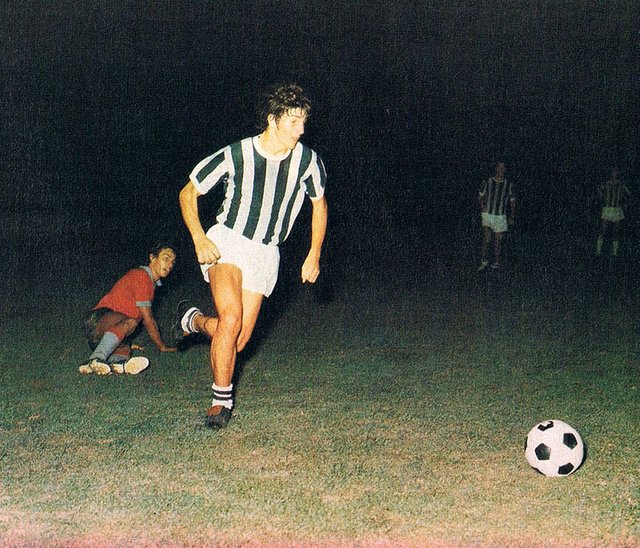
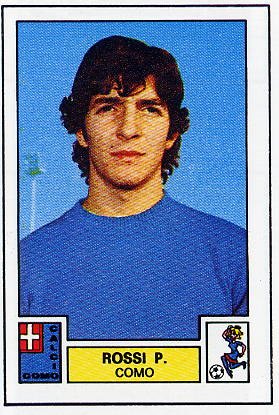
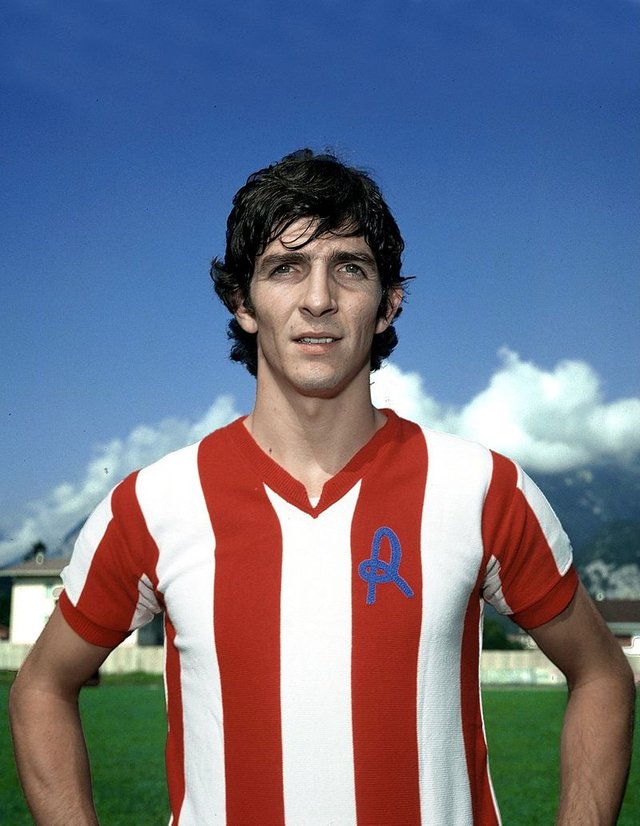
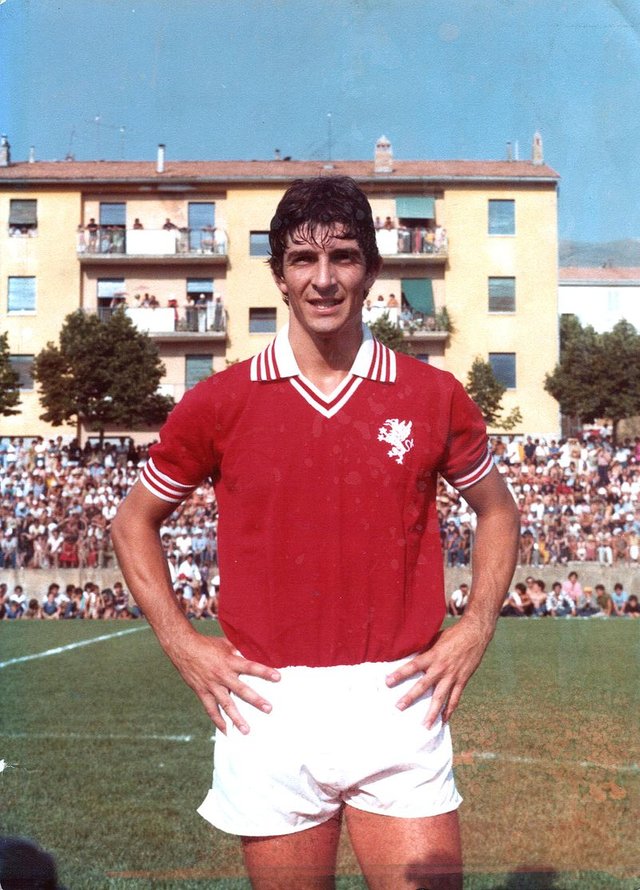
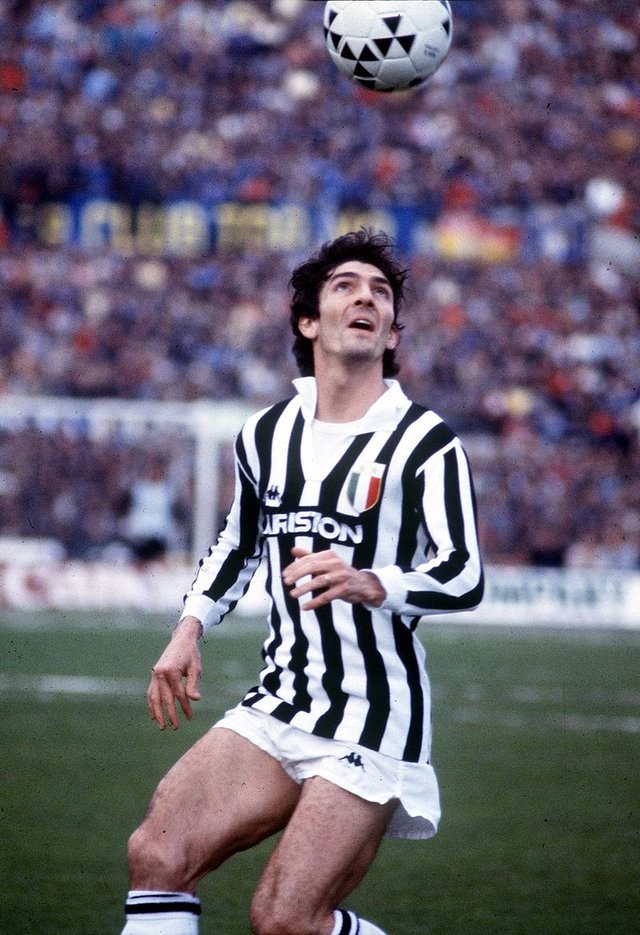
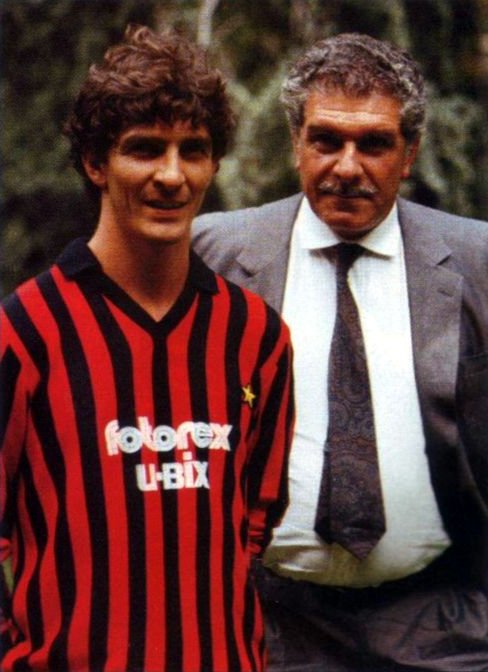
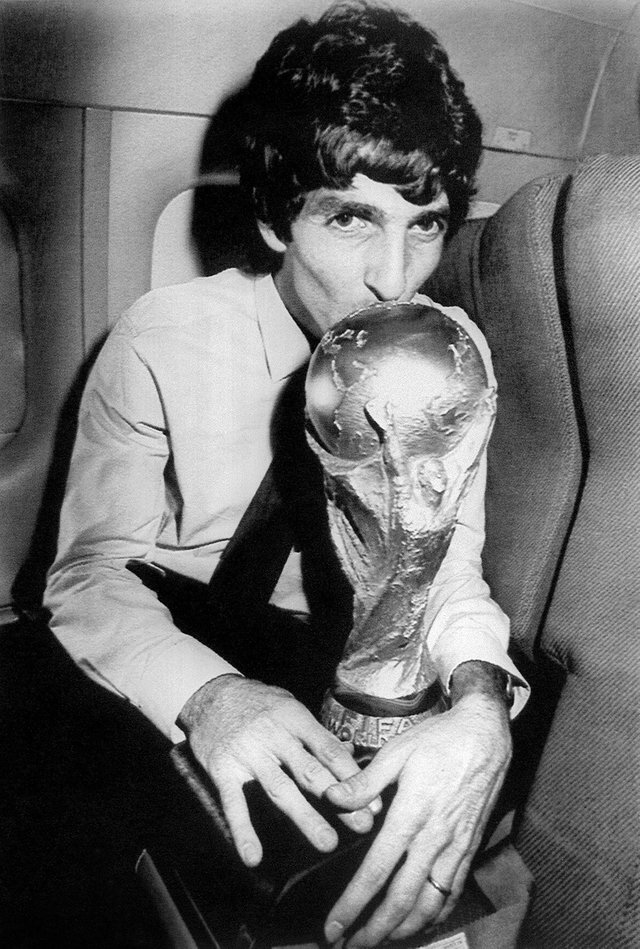
Che tristezza.....un grande campione e uomo discreto.
Hai perfettamente ragione. È sempre stato un ragazzo umile, appartenente ad una generazione di calciatori per la quale contavano molto anche i valori fuori dal campo.
Paolo Rossi, che grande calciatore!
Ricordo la finale tra Italia e Germania ai mondiali del 1982 come se fosse avvenuta ieri. Mi trovavo al ristorante del campeggio di Riva di Ugento che era pieno di tedeschi e italiani. Che serata e che nottata!
Chissà che emozione! Io avevo sei anni e ho ricordi molto sfumati, ma posso capire cosa devi aver provato, la soddisfazione e la gioia! Grazie per il commento!
This post has been upvoted by @steemcurator06, the account that curates The European Communities with the support of the Steem Community Curation Project.
@girolamomarotta
Italy Country Representative 🇮🇹
Thank you!